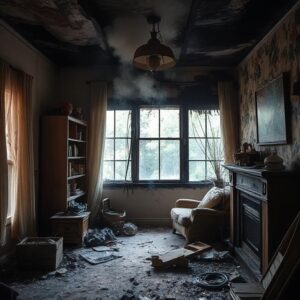After experiencing a fire, many people ask themselves, is it safe to stay in a house with smoke damage? Although the damage done is not necessarily visible from the outside, unseen smoke damage is a peril that could seriously affect health. A case in point is the Eaton Fire in California, which brought a new twist to this dilemma, as it left thousands of homes covered with toxic ash. Many residents faced problems regarding insurance companies such as the California FAIR Plan, which denied any claims of smoke damage unless it was termed as visible physical loss. Stories like these highlight that addressing smoke damage isn’t just about convenience, it’s about protecting both immediate health and long-term well-being.

What Makes Smoke Damage Dangerous?
The smoke that contains harmful particles and chemicals from fires settles on every surface inside a house. From furniture to carpets, even the insulation and walls absorb these toxic particles. Over time, these particles re-emerge into the air, thus reducing indoor air quality and posing a risk at all times.
Smoke-damaged homes contain many toxicants such as carbon monoxide, formaldehyde, and fine particulate matter. Prolonged exposure can cause respiratory issues, headaches, skin irritation, and sometimes chronic diseases like cancer. Vulnerable populations like children, the elderly, and those with pre-existing health conditions are particularly at risk. This is why answering the question, Is it safe to stay in a house with smoke damage? requires careful consideration of these invisible threats.
Is Your Home as Secure as It Could Be? Let’s Find Out
A professional assessment may be obtained, as hidden dangers such as toxins and poor air quality may not be so apparent. Though it may seem hard to believe, the next essential thing to figure out is if it is safe to live in a home with smoke damage. Environmental experts can test for these hazards, identify areas requiring remediation, and provide a clear picture of your home’s safety. Addressing air quality should also be a top priority, as smoke damage can introduce contaminants that linger in the air. Simple measures like using HEPA air purifiers, cleaning air ducts, and replacing HVAC filters can improve the air, but for severe contamination, professional cleaning services and specialized equipment like ozone generators may be necessary.
A fire does not have to come in direct contact with your home for there to be structural damage; damage is well within the realm of possibility. Smoke and heat could jeopardize the integrity of electrically sensitive components, such as wiring, insulation, or walls, and create hazards such as electrical fires or mold. A detailed inspection can help uncover these hidden threats. Finally, restoration costs are a key factor; for some, the high expenses outweigh the benefits of staying. If restoring the house feels impossible, selling might be a solution to avoid unsafe living conditions.
Steps to Take If You Decide to Stay
Should you choose to remain in your smoke-damaged home, consider the following actions to protect your health:
- Deep Cleaning: Have professionals clean all surfaces, carpets, and furniture to remove soot and residues.
- Seal Porous Materials: Smoke particles can linger in porous items like drywall and wood. Sealing these surfaces can help lock in contaminants, preventing them from leaching into your air over time.
- Monitor Air Quality: Air quality monitors should be procured to monitor levels of toxins in your home’s environment. Accordingly, venting and purifying systems need to be adjusted based on these readings.
- Replace Damaged Items: Such objects include mattresses, pillows, or extensively contaminated furniture that may have to be replaced since such items contain unsafe chemicals and have been impossible to clean properly.
Making the Tough Decisions
Whether to stay or leave a smoke-damaged house is purely personal judgment. The role is played by the financial situation, emotional connections, and possible health risks. Still, the juggernaut consideration should always be the safety of your family first. If experts confirm the house cannot be restored or cleaned, temporary or permanent relocation may be the best solution.
Selling the property is one way forward for people who cannot stay. The market of fire-damaged houses for sale has grown to find buyers who are passionate about taking on restoration. With the right professional appraisal, this option may yield enough funds to scout for a more healthy living space.
Previous